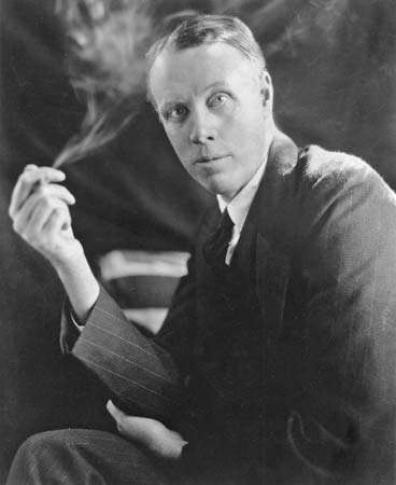H. S. Lewis (1885-1951)

H. S. Lewis won the Nobel Prize for Literature in 1930...
American novelist, playwright, and social critic who gained popularity with satirical novels. Sinclair Lewis won the Nobel Prize for Literature in 1930, the first given to American. His total output includes 22 novels and three plays. Though Lewis criticized at times the American way of living, his basic view of the "American human comedy" was optimistic.
* * *
“They were staggered to learn that a real tangible person, living in Minnesota, and married to their own flesh-and-blood relation, could apparently believe that divorce may not always be immoral; that illegitimate children do not bear any special and guaranteed form of curse; that there are ethical authorities outside of the Hebrew Bible; that men have drunk wine yet not died in the gutter; that the capitalistic system of distribution and the Baptist wedding-ceremony were not known in the Garden of Eden; that mushrooms are as edible as corn-beef hash; that the word "dude" is no longer frequently used; that there are Ministers of the Gospel who accept evolution; that some persons of apparent intelligence and business ability do not always vote the Republican ticket straight; that it is not a universal custom to wear scratchy flannels next the skin in winter; that a violin is not inherently more immoral than a chapel organ; that some poets do not have long hair; and that Jews are not always peddlers or pants-makers.
* * *
"Where does she get all them theories?" marveled Uncle Whittier Smail; while Aunt Bessie inquired, "Do you suppose there's many folks got notions like hers? My! If there are," and her tone settled the fact that there were not, "I just don't know what the world's coming to!”
* * *
“The Senator was vulgar, almost illiterate, a public liar easily detected, and in his "ideas" almost idiotic, while his celebrated piety was that of a traveling salesman for church furniture, and his yet more celebrated humor the sly cynicism of a country store. Certainly there was nothing exhilarating in the actual words of his speeches, nor anything convincing in his philosophy. His political platforms were only wings of a windmill.”
* * *
“I think perhaps we want a more conscientious life. We're tired of drudging and sleeping and dying. We're tired of always deferring hope to the next generation. We're tired of hearing the politicians and priests and cautious reformers (and the husbands!) coax us, 'Be calm! Be patient! Wait! We have plans for a Utopia already made; just give us a bit more time and we'll produce it; trust us; we're wiser than you.' For ten thousand years they've said that. We want our Utopia now - and we're going to try our hands at it. All we want is - everything for all of us! For every housewife and every longshoreman and every Hindu nationalist and every teacher. We want everything. We sha'n't get it. So we sha'n't ever be content -”
* * *
“The cocktail filled him with a whirling exhilaration behind which he was aware of devastating desires—to rush places in fast motors, to kiss girls, to sing, to be witty. ... He perceived that he had gifts of profligacy which had been neglected.
* * *
“I’m a middle-class intellectual. I’d never call myself any such a damn silly thing, but since you Reds coined it, I’ll have to accept it. That’s my class, and that’s what I’m interested in. The proletarians are probably noble fellows, but I certainly do not think that the interests of the middle-class intellectuals and the proletarians are the same. They want bread. We want—well, all right, say it, we want cake!”
“A country that tolerates evil means- evil manners, standards of ethics-for a generation, will be so poisoned that it never will have any good end.”
“In Floral Heights and the other prosperous sections of Zenith, especially in the “young married set,” there were many women who had nothing to do. Though they had few servants, yet with gas stoves, electric ranges and dish-washers and vacuum cleaners, and tiled kitchen walls, their houses were so convenient that they had little housework, and much of their food came from bakeries and delicatessens. They had but two, one, or no children; and despite the myth that the Great War had made work respectable, their husbands objected to their “wasting time and getting a lot of crank ideas” in unpaid social work, and still more to their causing a rumor, by earning money, that they were not adequately supported. They worked perhaps two hours a day, and the rest of the time they ate chocolates, went to the motion-pictures, went window-shopping, went in gossiping twos and threes to card-parties, read magazines, thought timorously of the lovers who never appeared, and accumulated a splendid restlessness which they got rid of by nagging their husbands. The husbands nagged back.”
(Sinclair Lewis)




 del.icio.us
del.icio.us Digg
Digg

Post your comment